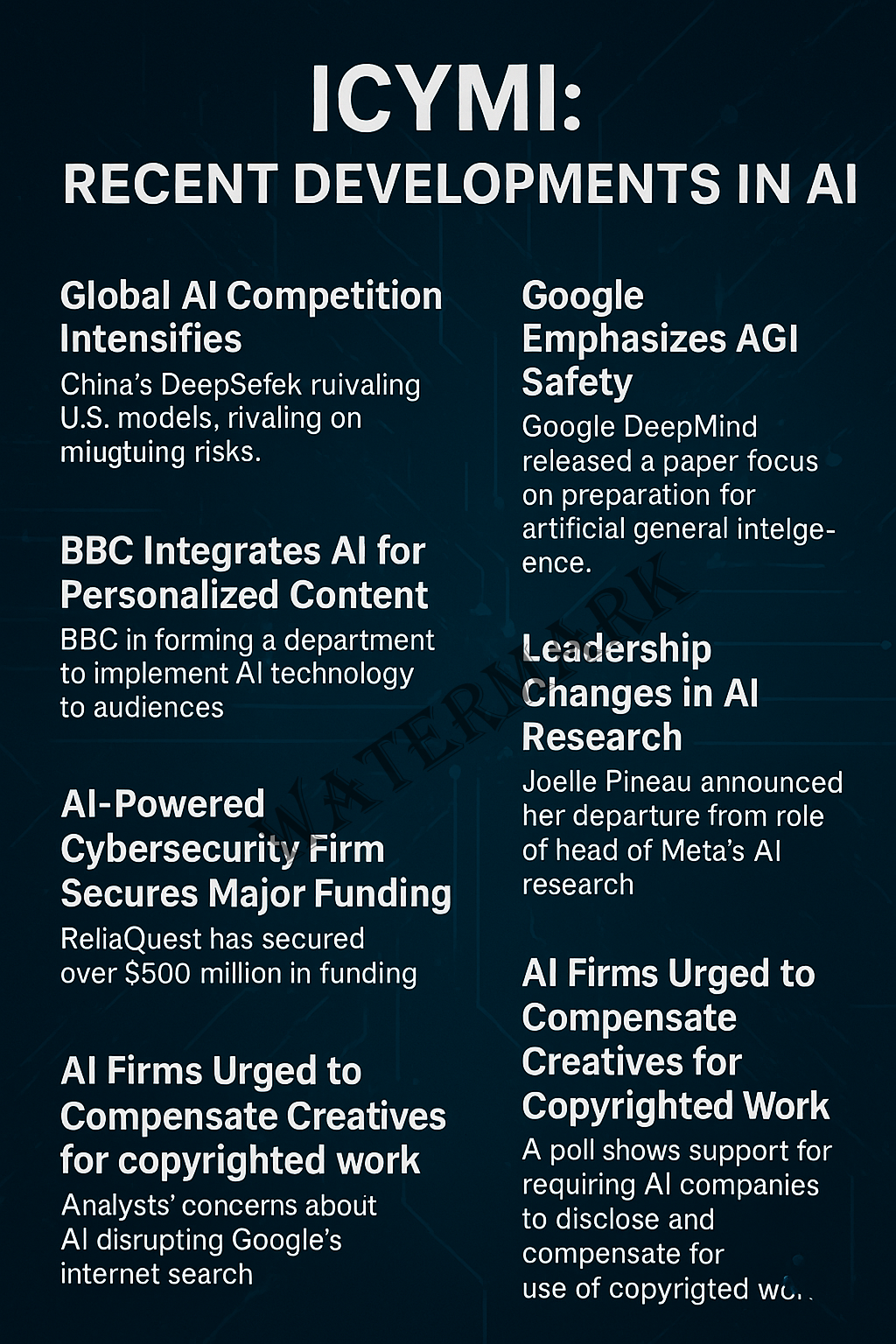1. Global AI Competition Intensifies with China’s Emergence
The artificial intelligence (AI) landscape has evolved into a fiercely competitive and global arena, with significant contributions emerging from various countries. Stanford University’s Institute for Human-Centered AI (HAI) released its 2025 AI Index, highlighting this trend. Notably, China’s DeepSeek has made a remarkable entrance with its R1 model, which rivals top U.S. models despite limited access to advanced computing resources due to U.S. export restrictions. China now leads in AI paper publications and patent filings, though the U.S. continues to produce more notable models. This shift indicates a more globalized race toward artificial general intelligence (AGI). WIRED
The report also underscores the rise of open-weight AI models, meaning they can be downloaded and modified for free. Meta’s Llama models and DeepSeek’s offerings are notable examples. Additionally, AI hardware has become 40% more efficient, making advanced AI more accessible. However, the industry faces challenges, including increased incidents of AI misuse and model failures, prompting more safety research. The demand for AI-skilled workers and private and governmental investments in AI have surged. Some models already surpass human abilities in specific tasks, highlighting rapid progress toward AGI.
2. Google DeepMind Pushes Urgent AGI Safety Planning
In a landmark 145-page paper released recently, Google DeepMind is sounding the alarm on the urgent need to prepare for artificial general intelligence (AGI)—AI that matches or surpasses human intelligence across a wide range of tasks. As the industry races to build ever more powerful models, driven by national competitiveness and corporate ambition, DeepMind’s researchers argue that it’s equally critical to address how to safely manage these technologies before they become too powerful to control.
The paper categorizes AGI risks into four areas: deliberate misuse (e.g., weaponization), misalignment (where AI systems behave in unintended ways), accidents, and structural risks (emergent harms from interactions between AI agents). DeepMind recommends a multi-pronged approach: rigorous development safeguards by AI companies, policy reforms, societal awareness, and most importantly, global regulation. The report doesn’t offer one-size-fits-all solutions but stresses that proactive preparation is essential.
What’s striking is the timing. While global governments increasingly emphasize AI supremacy over safety—especially in political settings like the recent Paris AI Action Summit—DeepMind’s warning counters this narrative. Key figures like Shane Legg, Chief AGI Scientist at DeepMind, and even AI pioneers like Yoshua Bengio and Dario Amodei, have voiced concerns about the complacency growing in the AI world. Google’s message is clear: even if AGI isn’t arriving tomorrow, the groundwork for its safe integration must begin today.
3. BBC News Launches AI Department to Personalize Content
In a bold move to modernize its digital strategy and maintain relevance among younger audiences, BBC News has announced the creation of a new department: “Growth, Innovation and AI.” Spearheaded by BBC News chief executive Deborah Turness, the new initiative reflects a broader transformation aimed at reshaping how news is delivered, consumed, and personalized in the era of AI.
The department’s core mission is to use artificial intelligence to deliver highly personalized news experiences. This means curating content that aligns with a user’s interests and viewing habits—similar to how social media algorithms serve up relevant posts. With audiences increasingly turning to platforms like TikTok and Instagram for news, especially those under 25, the BBC recognizes the need to adapt rapidly. AI will enable the organization to serve stories in formats optimized for smartphones, where brevity and relevance are key.
Turness emphasized that this change is part of a larger effort to overcome declining broadcast engagement, increased digital competition, and widespread news avoidance. She stated that the BBC must “become ruthlessly focused on understanding our audience’s needs” and use AI not just as a technological upgrade, but as a critical tool to remain competitive in a “fiercely competitive digital environment.”
Importantly, the BBC maintains that any AI use will align with its long-standing public service values—ensuring accuracy, impartiality, and privacy are never compromised. This measured approach contrasts with some other media outlets that are experimenting more aggressively with AI-driven content generation.
4. Joelle Pineau Departs Meta Amid Generative AI Pivot
Joelle Pineau, a highly respected figure in the AI research world and the longtime head of Meta’s Fundamental AI Research (FAIR) group, has announced her departure after nearly eight years with the company. Her exit comes during a pivotal moment for Meta, as it ramps up investments in generative AI technologies to compete with OpenAI, Google DeepMind, and Anthropic.
Under Pineau’s leadership, FAIR played a foundational role in advancing open-source AI research, contributing significantly to the development of large language models and reinforcement learning techniques. Her departure marks not just a leadership transition but possibly a strategic shift for Meta itself. While Pineau was an advocate for long-term, fundamental AI research, Meta is now pivoting aggressively toward productizing generative AI—focusing on tools like AI-powered assistants, content generation tools for Instagram and Facebook, and even its own large language models (e.g., LLaMA).
Pineau’s exit could indicate tensions between the pursuit of long-term research and the more immediate commercial demands of the generative AI boom. It also reflects a broader trend in the industry: seasoned researchers moving away from corporate labs that are shifting focus from foundational science to market-ready applications.
This leadership change puts FAIR’s future direction in question—and raises the stakes for Meta’s AI ambitions in 2025 and beyond.
5. ReliaQuest Secures Over $500 Million to Enhance AI-Driven Cybersecurity
ReliaQuest, a cybersecurity firm specializing in AI-driven detection and response, has secured over $500 million in funding, bringing its market valuation to $3.4 billion. The funding will support the company’s global expansion and enhance its offerings in integrating with over 200 cybersecurity and enterprise tools. ReliaQuest’s platform utilizes AI agents to detect and respond to cyberattacks within minutes, addressing the increasing complexity and frequency of cyber threats. WSJ+5WSJ+5WSJ+5
The investment reflects a broader trend in the cybersecurity sector, where venture investment into cybersecurity startups globally increased 69% in the first quarter from the prior quarter, according to analytics provider Crunchbase. This surge is partly attributed to the integration of AI technologies, which enhance the efficiency and effectiveness of cybersecurity solutions. ReliaQuest’s successful funding round underscores the growing importance of AI in cybersecurity and the confidence investors have in AI-driven approaches to threat detection and response. WSJ
6. UK MPs Advocate for AI Firms to Compensate Creatives for Copyrighted Work
A recent poll suggests that a significant majority of UK Members of Parliament (MPs) support requiring artificial intelligence (AI) companies to disclose and compensate for the use of copyrighted material. The poll, commissioned by the Publishers Association, comes amid government debates on potential legal changes that could allow tech firms to use copyrighted works without prior permission. Many in the creative industries, whose annual worth totals £126 billion, have voiced strong opposition to these legal changes, arguing that they undermine their livelihoods. Latest news & breaking headlines+1Latest news & breaking headlines+1
Notable authors and designers have also called for AI companies like Meta to address copyright infringement allegations in Parliament. The survey, conducted by Savanta, indicated that 92% of MPs believe AI firms should declare the use of copyrighted materials to authors and publishers, with 85% emphasizing that using such materials without payment undermines intellectual property. While some MPs acknowledge that payment requirements could slow AI research, there is broad cross-party support for increased transparency and fair compensation. The government asserts that it is committed to creating a balanced policy that fosters both creative and tech sector growth. Latest news & breaking headlines+1Latest news & breaking headlines+1
7. Analysts Express Concern Over AI’s Potential Disruption to Google’s Search Business
Analysts are expressing concerns that AI chatbots may soon disrupt Google’s dominance in internet search, drawing parallels to how digital cameras disrupted Kodak’s film business. While Google’s search business hasn’t shown significant decline yet, there are predictions of potential issues arising by 2026 as AI technologies evolve.
The rise of AI agents capable of handling queries in a conversational manner poses a risk to traditional search models. Stifel analyst Mark Kelley noted that Alphabet is “best positioned in the AI Agent arena,” but the shift towards AI agents could still impact Google’s core business. Kelley rates Alphabet as a Buy with a target price of $225, acknowledging both the challenges and opportunities presented by AI advancements. Barron’s
? References
These are the primary sources used in this ICYMI roundup:
- Google calls for urgent AGI safety planning
Axios, April 2, 2025 - BBC News to create AI department to offer more personalised content
The Guardian, March 6, 2025 - Meta’s Head of AI Research Joelle Pineau Steps Down
Barron’s, March 2025 - AI-powered Cybersecurity Firm ReliaQuest Raises Over $500 Million
Wall Street Journal, March 2025 - MPs Say AI Firms Must Pay Creatives for Copyrighted Work
The Times, March 2025 - AI Could Disrupt Google Like Kodak Was Disrupted by Digital Cameras
Barron’s, March 2025 - Stanford AI Index Report 2025 – Global Trends and the Rise of China
Wired, April 2025
? Additional Resources
Perfect for readers who want to go further down the AI rabbit hole:
- Stanford Institute for Human-Centered AI (HAI) – AI Index 2025
hai.stanford.edu/research/ai-index-2025 - OECD AI Policy Observatory
oecd.ai - AI Ethics Guidelines Global Inventory (by AlgorithmWatch)
algorithmwatch.org/en/project/ai-ethics-guidelines-global-inventory - DeepMind – AGI Safety Frameworks & Papers
deepmind.com/research - Creative Commons – AI & Copyright Toolkit
creativecommons.org/ai
? Additional Reading
A few thought-provoking reads that complement this month’s ICYMI AI update:
- “Tools for Humanity: The AGI Debate and Global Governance” – Brookings Institution
- “AI and the Future of Newsrooms” – Nieman Lab
- “Understanding Copyright in the Age of Generative AI” – Electronic Frontier Foundation (EFF)
- “Will AI Replace Google?” – The Atlantic
“AI in Cybersecurity: Threats, Promises, and Realities” – MIT Technology Review




